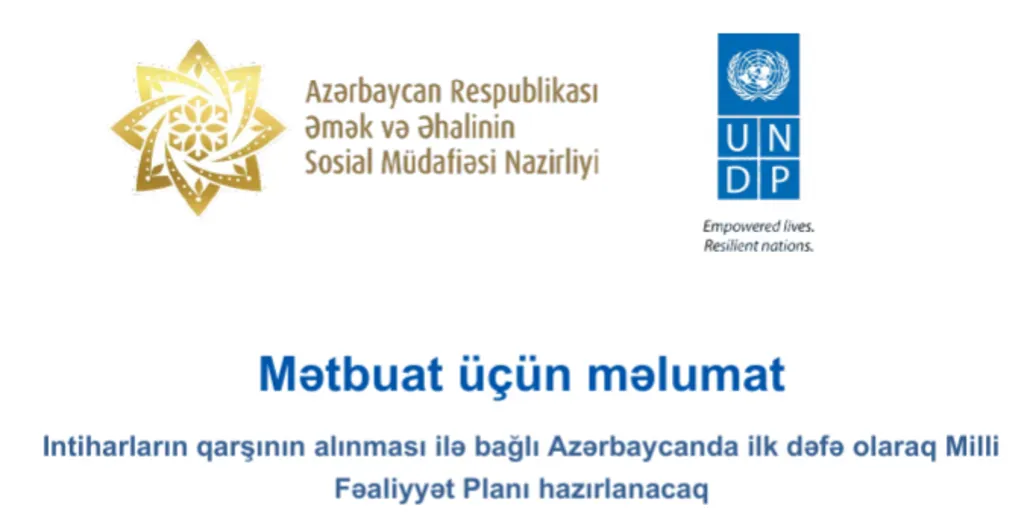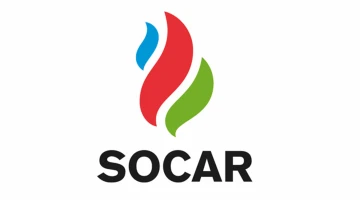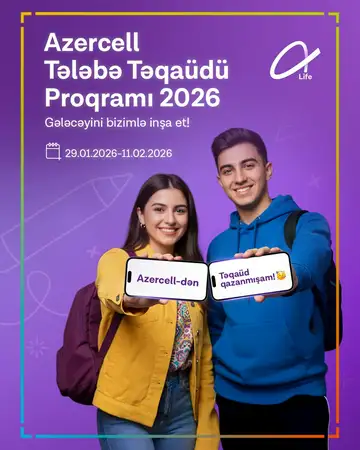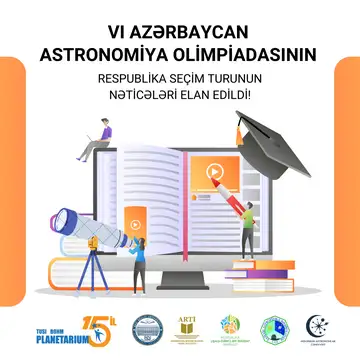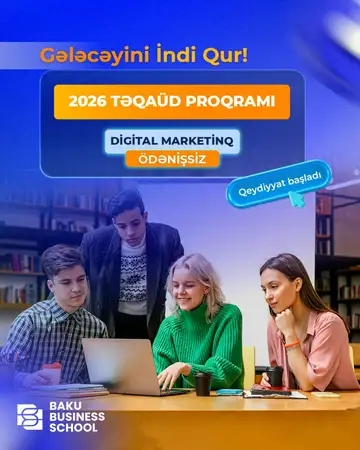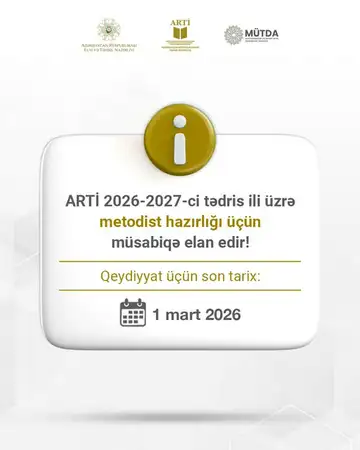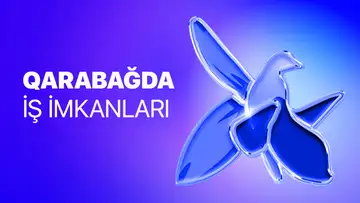BMT-də yeni vakansiya!
Agentlik: BMT-nin İnkişaf Proqramı (UNDP Azerbaijan)
☑️Vəzifə: Layihə meneceri
☑️Maaş: 5370 AZN
❗️Müraciət üçün son gün: 16 dekabr
Project Title: Promoting the Role of Civil Society in Gender-sensitive SDG Implementation
Title: Project Manager
Grade: SB 4/3
Agency: UNDP
Duration: 1 year service contract with possibility for extension
Remuneration: Gross AZN 5370 per month (subject to tax), plus social security package
Duty Station: Baku, Azerbaijan. Domestic travel will be required.
Project Background
Following the progress made under the MDGs, 193 UN Member States, including Azerbaijan, endorsed the 2030 Agenda on Sustainable Development at the United Nations Summit in September 2015. The new Agenda, with its 17 Sustainable Development Goals (SDGs) and 169 accompanying targets, came into effect in January 2016.
SDGs agenda is too complex and ambitious to be realized by governments on their own. Recognizing this fact, the 2030 Agenda embeds an unprecedented spirit of broad-based participation and inclusiveness and calls for all countries and stakeholders to act in collaborative partnership to implement SDG commitments. All signatory countries have committed to involve civil society in the implementation of the 2030 Agenda at the country level in accordance with country policies. The text of the 2030 Agenda for Sustainable Development repeatedly frames the implementation of the Agenda in terms of partnerships between governments, the private sector, civil society, the UN system and other actors. This makes it very clear that national governments are not the only, or in some cases, primary drivers of transformation towards sustainable development, and those partnerships will be crucial to catalyze action.
CSOs as key actors in the implementation of the SDG agenda
Strong participation of civil society in the implementation, follow-up and review of the SDGs represents a continuation of the inclusive character that defined the negotiations on the SDGs. SDG#17 calls for “partnerships between governments, the private sector and civil society” for successful implementation of SDGs.
Civil society can play several roles in the SDG implementation processes. Their biggest role will be translating the voices of the poorest and most marginalised citizens into rational or strong arguments that are acknowledged and addressed by the local governments. The CSOs are well positioned to identify vulnerable, left-behind populations whose interests and rights are overlooked in the development process, understand their needs and concerns and translate their voices into arguments that are heard and addressed by the governments.
CSOs play a critical role as transformers in society by being involved in training and advocacy processes, which build the capacities and knowledge of the general populace towards achieving the SDGs. This will ensure that people become the focus of the SDGs and that the most vulnerable in society are not left behind when these global development goals are localised.
Civil society groups can also be agents of accountability that will ensure that governments are held responsible for results. By adopting the 2030 Agenda governments also agreed to conduct regular and inclusive national reviews of progress drawing on contributions from civil society, community groups, and other stakeholders.
While national governments hold primary responsibility for delivering services in their country, CSOs, communities and private sector also play a key role, particularly in situations where governments lack capacity, capability or the will to provide essential services for their citizens.
In addition, CSOs have an important role to play in data collection by promoting innovative tools such as mobile technology and IT-based platforms that complement traditional forms of large-scale data collection. Beyond supporting data collection, CSOs also have an important role in directly monitoring the local implementation of the SDGs.
Situation in Azerbaijan
On October 6th, 2016, the President of the Republic of Azerbaijan signed a decree establishing the National Coordination Council for Sustainable Development (NCCSD), which has the potential to mark a significant step towards promoting further participatory policy dialogue on longer term Sustainable Development of Azerbaijan and integrating into the national development agenda.
In its Voluntary National Review presented to the 2017 High Level Political Forum in July 2017, the Government of Azerbaijan considers the national SDG process as an opportunity to empower a broader range of national stakeholders, promote participative national dialogue and streamline wider cooperation on the path to sustainable development. Driven by the principle of “leaving no one behind”, and determined to engage all stakeholders in achieving the SDGs, NCCSD, in partnership with UNDP, conducted a series of panel discussions on SDG implementation which brought together representatives of the different groups of society (civil society, women, youth, academia, parliament).
The government expressed its willingness to facilitate and support SDG-focused initiatives of civil society institutions, academia, business and professional associations, other stakeholders and partners. This provides a good foundation for developing a multi-stakeholder partnership for the attainment of nationalized SDGs.
The 2030 Agenda particularly stresses the role of women and girls as accelerators for various aspects of sustainable development. Given that gender is a global SDG accelerator, it is essential that the stakeholders pursue attainment of 14 SDGs with gender related targets in a complex manner by integrating gender issues in spheres like employment, education, health, access to resources, etc. In this view, the project will support civil society driven SDGs implementation through gender lens.
The project’s target groups will be local CSOs that will benefit from the project in several ways. The project will create understanding and awareness of the SDG agenda among the CSOs and provide the CSOs with an opportunity to discuss with the government the national SDG agenda. The CSOs will also be enabled, through the pilot project scheme, to better represent the left-behind population groups and voice their concerns.
The project
overall objective of the project is to promote greater participation of the civil society organizations in the gender-sensitive implementation of the national SDG agenda. The
specific objectives are: i) to promote confidence building and dialogue between the civil society and the government around the SDGs issues; ii) to improve understanding and knowledge of CSOs, to apply gender-responsive approach to SDG implementation; iii) to increase participation of the CSOs in the implementation of gender sensitive SDG initiatives.
Key project stakeholders will be:
- Civil society organizations – the primary recipients of the technical assistance and financial support from the action and the key agents for change that will ensure the action’s impact and sustainability of results in the medium to long-term perspective.
- National Coordination Council on Sustainable Development (NCCSD), is the primary government stakeholder of the project that will be closely involved in the implementation of the relevant activities.
- State Committee for Family, Women and Children Affairs (SCFWCA) is the principal government body responsible for formulation, coordination and implementation of women policies. SCFWCA will be the main Government stakeholder to engage in the policy debate on gender-responsive policies and measures in the context of the SDG implementation.
- Local authorities – executive power and municipalities – can act as counterparts for the implementation of the CSOs initiatives. The local authorities as the main source of knowledge on the local situation, and convening power, are evident counterparts for mobilization of communities, provision of inputs into the assessments, selection of target groups and beneficiaries, organization of local events.
- Development partners (UN agencies, IFIs, SDC, EU and others) supporting SDGs and gender-related development projects and initiatives in Azerbaijan will be important project stakeholders to share, coordinate and collaborate with the action as and where relevant.
Scope of Work
UNDP manages and maintains the oversight
on the overall project implementation, its budget and procurement of required inputs. The Project Manager will be responsible for the overall management of the project, including the mobilization of all project inputs, supervision over project staff, consultants and sub-contractors. The Project Manager will be tasked with the day-to-day management of project activities, as well as with financial and administrative reporting.
The Project Manager
’s prime responsibility is to ensure that the project produces the planned outputs and achieves the planned indicators and indicator targets by undertaking necessary activities specified in the project document to the required standard of quality and within the specified constraints of time and cost. This will require linking the indicators to the work plan to ensure Results-Based Management.
UNDP supports co-ordination and networking with related initiatives, institutions and similar projects in the country. In the course of overall project implementation UNDP will closely work with the NCCSD and engage the CSOs into the dialogue and collaboration for the SDGs implementation. The Project Manager will work in close collaboration with the NCCSD and CSOs.
The Project Manager will report to the
UNDP Azerbaijan Programme Analyst (or other duly designated UNDP Officer) for all of the project’s substantive and administrative issues. The Project Manager will report on annual basis to the Project Steering Committee (PSC). The Project Manager will be responsible for meeting all obligations under the project and will perform a liaison role with the NCCSD, UNDP and other UN Agencies, CSOs and other project partners.
Duties and Responsibilities
- Supervise and coordinate the production of project outputs, as per the project document;
- Mobilize all project inputs in accordance with procedures for nationally implemented projects;
- Coordinate the recruitment and selection of project personnel;
- Supervise and coordinate the work of all project staff, consultants and sub-contractors;
- Prepare and revise project work and financial plans;
- Supervise and coordinate the production of project outputs, as per the project document;
- Liaise with UNDP, relevant government agencies, and all project partners, including donor organizations and CSOs for effective coordination of all project activities;
- Oversee and ensure timely submission of required donor reports, project progress reports, financial reports, and other reports as may be required by UNDP and donor;
- Disseminate project reports and respond to queries from concerned stakeholders;
- Report progress of project to the PSC, and ensure the fulfilment of PSC directives;
- Oversee the exchange and sharing of experiences and lessons learned;
- Ensure the timely and effective implementation of all components of the project;
- Coordinate and assist the NCCSD and CSOs with the initiation and implementation of project activities;
- Carry out regular, announced and unannounced inspections of all sites and project-funded activities;
- Ensure a results-based approach to project management – this means the Project Manager mustunderstand the project’s results framework indicators and respective indicator targets and verify these at project inception together with UNDP and any additional expertise. These indicators must then be linked on a daily basis to the project’s work;
- Coordinate and supervise the work of all consultants and sub-contractors, ensuring the timely delivery of expected outputs, and effective synergy among the various sub-contracted activities;
- Prepare Annual Work plans in advance of each successive year and submit them to the Project Executive Group for approval;
- Facilitate administrative backstopping to subcontractors and training activities supported by the Project.
Corporate Competencies:
- Demonstrates integrity by modelling the UN’s values and ethical standards
- Promotes the vision, mission, and strategic goals of UNDP
- Displays cultural, gender, religion, race, nationality and age sensitivity and adaptability
- Treats all people fairly without favouritism
Functional Competencies:
Knowledge Management and Learning
- Promotes knowledge management in UNDP and a learning environment in the office through leadership and personal example.
- Actively works towards continuing personal learning and development in one or more Practice Areas, acts on learning plan and applies newly acquired skills
Innovation and Marketing New Approaches – Developing new approaches
- Seeks a broad range of perspectives in developing project proposals;
- Identifies new approaches and promotes their use in other situations;
- Creates an environment that fosters innovation and innovative thinking;
- Makes the case for innovative ideas from the team with own supervisor.
Self-management/Emotional Intelligence
- Stays calm and maintains composure under stress or during a crisis, keeping disruptive emotions under control
- Adapts flexibly to changing situations, overcomes obstacles and recovers quickly from set-backs
- Tolerates conditions of stress, uncertainty or ambiguity and continues to maintain a positive outlook and to work productively
- Is realistic about own limits using support mechanisms as needed and maintaining an appropriate work-life balance
- Senses the emotions of others, understanding their perspective, taking an active interest in their concerns
- Fosters a positive outlook and maintains focus during period of stress and heavy work load, inspiring and guiding others towards goal achievement
- Creates a climate of enthusiasm and flexibility, where people feel encouraged to give their best
- Stands up to group pressure, not giving in out of a desire to please or to avoid confrontation and conflict
Promoting Organizational Learning and Knowledge Sharing – Developing tools and mechanisms
- Makes the case for innovative ideas documenting successes and building them into the design of new approaches;
- Identifies new approaches and strategies that promote the use of tools and mechanisms
Job Knowledge/Technical Expertise – In-depth knowledge of the subject-matter
- Understands more advanced aspects of primary area of specialization as well as the fundamental concepts of related disciplines;
- Keeps abreast of new developments in area of professional discipline and job knowledge and seeks to develop him/herself professionally;
- Demonstrates comprehensive knowledge of information technology and applies it in work assignments;
- Demonstrates comprehensive understanding and knowledge of the current guidelines and project management tools and utilizes these regularly in work assignments;
- Have effective interpersonal and negotiations skills and ability to coordinate complex, multi-stakeholder projects and be able to think in a strategic manner on complex and difficult projects;
- Strong drafting, presentation and reporting skills;
- Excellent written communication skills.
Client Orientation – Contributing to positive outcomes for the client
- Anticipates client needs;
- Works towards creating an enabling environment for a smooth relationship between the clients and service provider;
- Demonstrates understanding of client’s perspective.
Recruitment Qualifications
- Master’s degree in management and other related areas;
- At least 4 years of project/programme management experience (Proven management expertise – must be able to smoothly handle the political, technical, and people management challenges that will face the Project Manager on a daily basis. This is first and foremost the most important qualification)
- Experience in working with ministries and national institutions in Azerbaijan;
- Experience in effectively coordinate a large, multi-stakeholder project;
- Experience in administering budgets, train and work effectively with counterpart staff at all levels and with all groups involved in the project;
- Strong presentation and reporting skills;
- Strong computer skills, in particular mastery of all applications of the MS Office package and internet search;
- Advanced knowledge of social-economy sector related issues in Azerbaijan, including the political, institutional contexts is an asset;
- Excellent writing and oral skills in English and Azerbaijani.
To apply for the vacancy go to the below link:
https://jobs.partneragencies.net/erecruit.html
The guide on how to apply for online and FAQs are attached.
